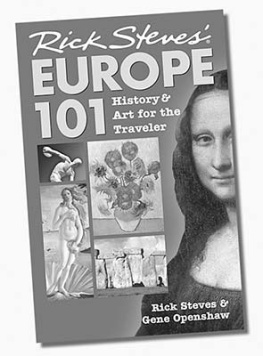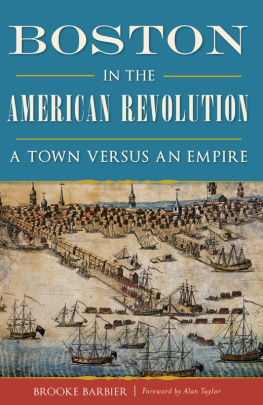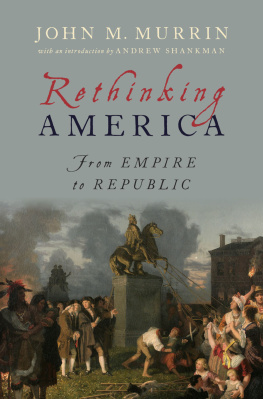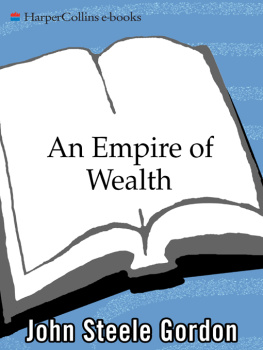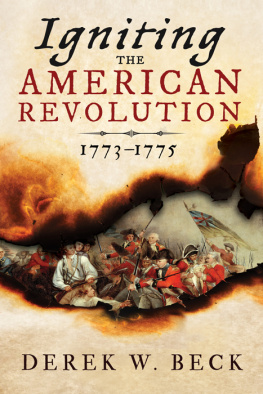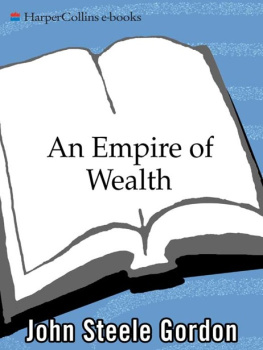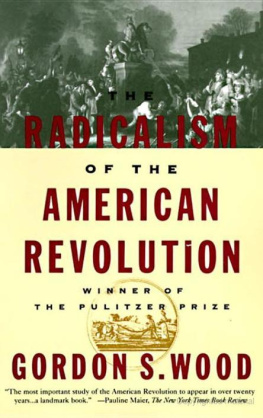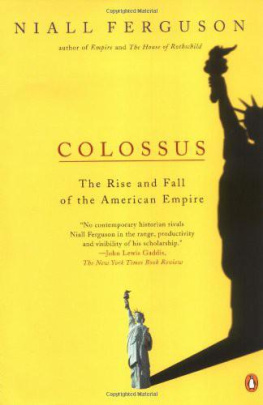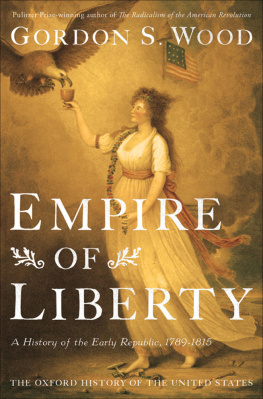THE AMERICAN REVOLUTION
WRITINGS FROM THE PAMPHLET DEBATE
II: 17731776
Gordon S. Wood, editor

THE LIBRARY OF AMERICA E-BOOK
Volume compilation, introduction, notes, and chronology 2015 by
Literary Classics of the United States, Inc., New York, N.Y.
All rights reserved.
No part of this book may be reproduced in any manner whatsoever without the permission of the publisher, except in the case of brief quotations embodied in critical articles and reviews.
Visit our website at www.loa.org.
THE LIBRARY OF AMERICA, a nonprofit publisher, is dedicated to publishing, and keeping in print, authoritative editions of Americas best and most significant writing. Each year the Library adds new volumes to its collection of essential works by Americas foremost novelists, poets, essayists, journalists, and statesmen.
Visit our website at www.loa.org to find out more about The Library of America, and to sign up to receive our occasional newsletter with exclusive interviews with Library of America authors and editors, and our popular Story of the Week e-mails.
eISBN 9781598534429
Print ISBN 9781598533781
The American Revolution:
Writings from the Pamphlet Debate 17731776
is kept in print by a gift from
SIDNEY AND RUTH LAPIDUS
to the Guardians of American Letters Fund,
established by The Library of America
to ensure that every volume in the series
will be permanently available.
The American Revolution:
Writings from the Pamphlet Debate 17731776
is published with support from
THE BODMAN FOUNDATION
Preface
What do we Mean by the Revolution? The War? That was no part of the Revolution. It was only an Effect and Consequence of it. The Revolution was in the Minds of the People, and this was effected, from 1760 to 1775, in the course of fifteen Years before a drop of blood was drawn at Lexington. The Records of thirteen Legislatures, the Pamphlets, Newspapers in all the Colonies, ought to be consulted, during that Period to ascertain the Steps by which the public Opinion was enlightened and informed concerning the Authority of Parliament over the Colonies.
John Adams to Thomas Jefferson, 1815
British imperial reforms undertaken in the 1760s sparked one of the most consequential constitutional debates in Western history. Taken up between American colonists and Britons and among the colonists themselves, this debate was carried on largely in pamphletsinexpensive booklets ranging in length from five thousand to twenty-five thousand words and printed on anywhere from ten to a hundred pages. Easy and cheap to manufacture, these pamphlets were ideal for rapid exchanges of arguments and counter-arguments. Pamphlets concerned with the American controversy from both sides of the Atlantic number well over a thousand, and they cover all of the significant issues of politicsthe nature of power, liberty, representation, rights, constitutions, the division of authority between different spheres of government, and sovereignty. This Library of America volume, the second of a two-volume set, presents the most interesting and important of these works, with a preference in selection for pamphlets directly in dialogue with one another. By the time the debate traced here was over, the first British Empire was in tatters, and Americans had not only clarified their understanding of the limits of public power, they had prepared the way for their grand experiment in republican self-government and constitution-making.
Introduction
The Peace of Paris of 1763 ending the Seven Years War made Great Britain the greatest power in the world. France, Britains principal enemy, had been humbled, her authority totally expelled from the North American continent. But victory had been costly and Britains national debt was staggering. Tens of thousands of native peoples in the west and over seventy thousand French subjects now had to be dealt with. At the same time the jerry-built imperial structure that had developed over a century and a half had to be reformed. Who was to pay for the administration of this newly enlarged empire and the peacetime army required to maintain order among its discordant parts? After years of war, English taxpayers were already overburdened. Since the results of the war greatly benefited the crowns North American subjects, British officials naturally looked to them for new revenues.
The result was a series of British administrative and legislative actions that would collectively assume for Americans the character of a conspiracy against their traditional rights. To prevent costly clashes with the Indians in the west, white settlers somehow had to be kept from encroaching on native lands. The first measure therefore was a royal proclamation in 1763 forbidding American colonists from moving westward across a line crudely drawn along the Appalachians. This act of crown prerogative was followed by a succession of parliamentary acts that increasingly inflamed colonial opinion. The Sugar Act of 1764 transformed the Molasses Act of 1733, which had sought only to regulate the flow of trade, into a revenue-raising measure. The British government recognized that the colonial customs systemso notoriously corrupt and ineffective that it failed to collect enough revenue even to cover the cost of its operationhad to be overhauled if it was to be productive of both proceeds and good order. So the Sugar Act also placed new regulatory burdens on colonial commerce, including the expanded use of writs of assistance (or search warrants) and the establishment of a vice-admiralty court in Halifax, Nova Scotia, which required no jury trials for enforcement. Under pressure from colonial merchants holding depreciated paper money that could not be used to pay their creditors in Britain, Parliament in 1764 also passed a Currency Act prohibiting colonial assemblies from making paper money legal tender; this had the effect of seriously restraining the colonists trade with one another. In 1765 the Quartering Act set down regulations requiring the housing and provisioning of British troops in America.
While these actions, engineered by George Grenville, the British prime minister, provoked protests in most of the colonies, American opposition to them was nothing compared to the firestorm ignited by Parliaments passage of the Stamp Act in the spring of 1765. This act levied a tax on legal documents, newspapers, and nearly every form of paper used in the colonies. Suddenly, the issue was no longer the commercial fairness of Britains attempts to remodel its empire. It had become a matter of constitutional principle, one that struck at the heart of the colonists relationship with the mother country.
Newspapers and pamphlets, the number and like of which had never appeared in America before, exploded in anger. Mobs in the thirteen colonies forced the stamp agents to resign, preventing the issuance of any stamps in all but one. (Before resigning, the stamp agent in Georgia did manage to distribute some stamps to customs officials who briefly used them in Savannah, infuriating colonists there and elsewhere.) In October 1765 thirty-seven delegates from nine colonies met in New York in the Stamp Act Congress and drew up a set of formal declarations denying Parliaments right to tax Americans. It is inseparably essential to the Freedom of a People, and the undoubted Right of




